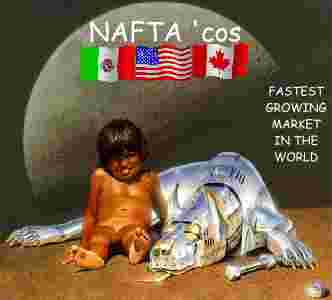|
As part of a strategy to diversify trade,
the Mexican Government entered the following Trade Treaties and Agreements
in 1994 and 1995:
|
I.- NAFTA

On January 1, 1994, the North American
Free Trade Agreement with the United States and Canada became effective.
This means quotas and duties on non-oil
Mexican exports will be fully eliminated within a 15 year term (See Exhibit
down)
Beginning 1994, tariffs have been eliminated
on 84% of all non-oil and non-agricultural and stock-breeding exports to
the United States and 79% of these exports to Canada.
|
II.- Economic Complementation
Agreement with Chile
In 1996, tariffs will be eliminated
from 94% of all items, including automobile goods and their parts. In 1998
an additional 2.9% will benefit from these exemptions, so that the elimination
of tariffs on all goods and services included in the Agreement will be
complete. The entered contemplates a wide and accelerated tariff exemption
and elimination of non-tariff barriers.
|
III.- Free Trade
Agreement with Costa Rica
On January 1, 1995 became effective. It
eliminated 70% of tariffs and duties on Mexican exports. An additional
15% will be eliminated within 5 years and the remaining 10%, in ten years.
|
IV.-
Free Trade Agreement with Colombia and Venezuela
Anticipates a gradual ten year tariff
elimination scheme for industrial products beginning 1995. The Venezuelan
automotive sector will be tariff exempted by January, 2007 and textiles
will be temporarily excluded from this program. The Agreement also provides
for the immediate elimination of tariffs on 40% of Mexican exports to Colombia
and on 7% of sales to Venezuela.
|
V.- Free Trade Agreement
with Bolivia
Became effective on January 1, 1995. It
contemplates an immediate tax exemption on 97% of Mexican exports. Taxes
on textiles and agricultural produce will be gradually eliminated within
the next four to fifteen years. The automobile industry will experience
a gradual removal of tariffs which will be completed by the year 2002.
|
VI.- Other Agreements
In addition, non-oil exports are favored
by existing preferential schemes across the European Union, Japan, Norway,
Switzerland, Australia, and New Zealand. These countries allow access to
a large number of Mexican goods with tariffs lower than those applied to
other countries, provided local content requirements are met.
|

